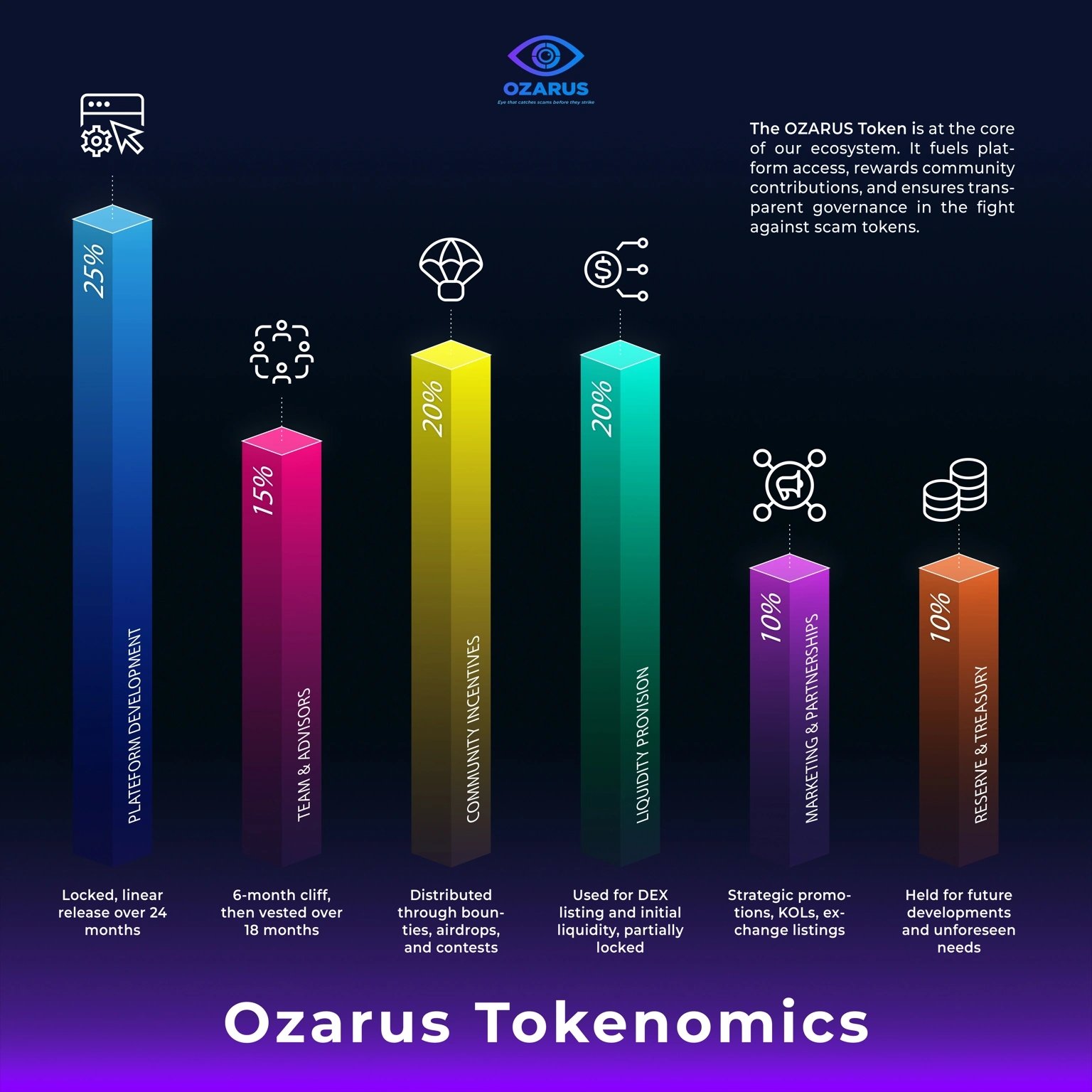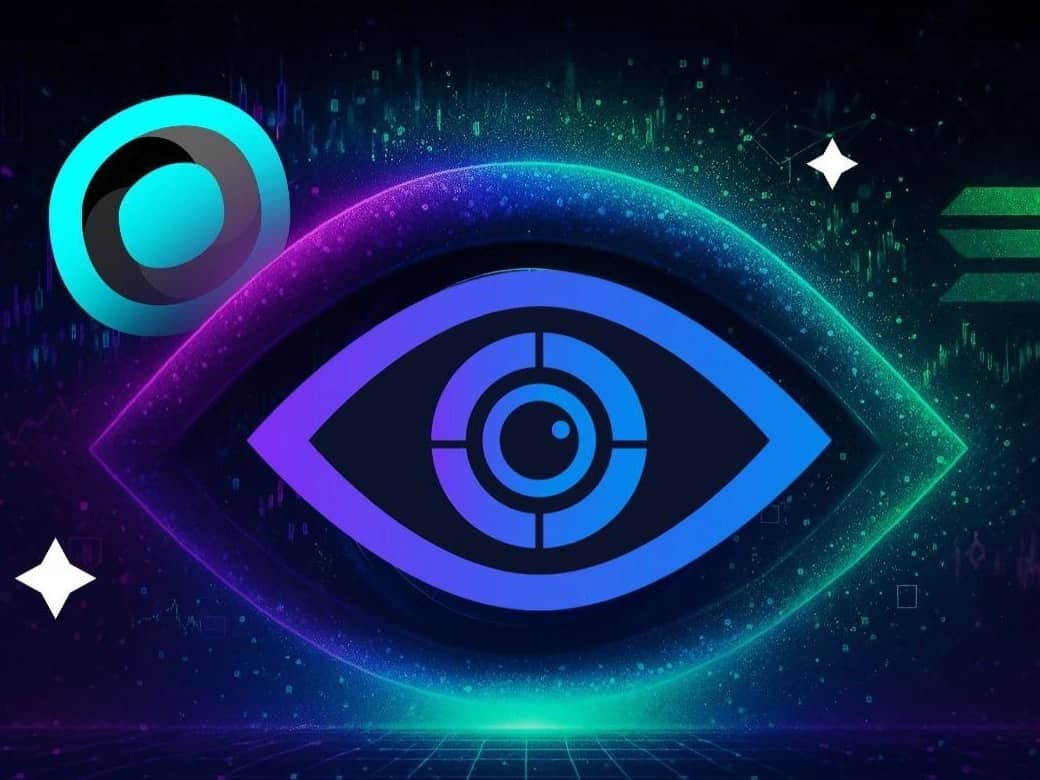Subscribe to wiki
Share wiki
Bookmark
Ozarus
The Agent Tokenization Platform (ATP):Build autonomous agents with the Agent Development Kit (ADK)
0%
Ozarus
Ozarus is an AI-driven, on-chain intelligence platform developed for the Solana blockchain. It is designed to provide traders and developers with real-time security analysis, risk assessment, and data-driven insights to help identify and avoid potential scams. [1]
Overview
Ozarus is an on-chain radar and risk analysis engine built on Solana, aiming to simplify Web3 security by providing real-time contract scanning and threat detection. Through a search interface, users can input a contract address to receive an automated analysis that flags risks such as unlocked mint or freeze authority, stealth taxes, liquidity issues, and suspicious wallet activity. Each analysis generates a security score ranging from 0 to 100%, providing traders and developers with a quick way to assess potential threats.
The platform uses AI to learn from scam patterns, verified data, and user feedback while cross-referencing Solana RPC nodes, decentralized databases, and on-chain events for accuracy. Users can also set up browser and Telegram alerts for live monitoring to stay ahead of potential exploits. Beyond scanning, Ozarus incorporates community governance by allowing token holders to suggest improvements, vote on developments, and access advanced security modules, making it both a protective and participatory layer in the Web3 ecosystem. [2] [3]
Products
On-Chain Intelligence Platform
The primary product is the Ozarus intelligence platform, which provides users with real-time security audits and data analysis for Solana-based tokens. Users can input a token's contract address to receive a detailed report covering smart contract vulnerabilities, liquidity status, holder distribution, and developer history. This service is designed to serve as the primary interface for traders seeking to verify the legitimacy and safety of a token. [1]
Elite Signals
Elite Signals is a premium subscription service that provides users with alerts for tokens that meet a strict set of predefined safety and reliability criteria. This feature is intended to help users identify potentially safer investment opportunities by filtering out tokens that exhibit common red flags. [8]
Delta Analyzer
The Delta Analyzer will be designed to identify tokens that exhibit on-chain characteristics and market patterns associated with high growth potential. This feature aims to provide users with data-driven insights to spot emerging opportunities within the Solana ecosystem. [2]
API Access
Ozarus will offer Application Programming Interface (API) access to its security and intelligence data. This service is targeted at developers, operators of trading bots, and institutional clients who wish to integrate Ozarus's risk analysis capabilities directly into their own applications, trading algorithms, or internal workflows. The API is intended to extend the platform's reach and utility across the broader Web3 development community. [5]
Features
Core Analytical Features
The platform's real-time scanning capabilities provide users with up-to-date on-chain metrics. This includes essential data points such as a token's market capitalization, the amount and status of its liquidity, the total number of holders, and the concentration of token distribution among top wallets. Analyzing holder distribution is critical for identifying risks of market manipulation by large holders, often called "whales." [1]
Security Audit Capabilities
A central component of Ozarus is its automated security audit, which examines the underlying smart contract of a token for potential vulnerabilities or malicious functions. Key checks include:
- Mint and Freeze Authority: The platform verifies if the contract allows a developer to create new tokens (mint) or prevent transfers (freeze). The existence of such authority is a significant risk, as it can lead to supply inflation or the locking of user assets.
- Contract Ownership: Ozarus checks if the smart contract has been renounced by its creator. If a developer retains ownership, they may be able to alter the contract's rules post-launch.
- Blacklist or Tax Functions: The audit scans for hidden functions that could allow developers to block certain wallets from trading or impose transaction taxes that can be altered at will.
- Liquidity Pool (LP) Status: The platform determines whether the token's liquidity pool is locked or burned. Unlocked liquidity allows developers to withdraw all funds from the pool, a common method used in rugpull scams. [2]
Developer Vetting
Ozarus analyzes the on-chain history of a token's development team. This process involves scanning the developer's wallet for connections to previously launched projects that were identified as scams or rugpulls. The platform also monitors for suspicious off-chain behavior, such as frequent changes to social media handles like X (formerly Twitter), which can be an indicator of a developer attempting to obscure their history. [1] [2]
AI-Powered Risk Scoring
The platform utilizes its proprietary Reliability & Risk Engine, which is powered by artificial intelligence, to process the collected data points. This engine generates a safety score for each token on a scale of 0 to 100. The score provides a simplified, at-a-glance assessment of a token's overall risk profile, enabling users to quickly gauge its potential security threats. The platform also includes a social sharing feature that allows users to export branded images of these analysis reports directly to X. [1] [2]
Technology
Ozarus is built on the Solana blockchain, utilizing its high throughput, low latency, and scalability to deliver rapid smart contract analysis and security insights. The platform combines AI-driven logic, contract parsing modules, and layered flagging algorithms to detect risks within seconds. Each scan leverages real-time indexing from Solana RPC nodes and incorporates checks such as code-level logic detection, contract structure validation, liquidity and holder distribution analysis, and ongoing pattern matching against known threat profiles.
Its architecture is designed with modularity in mind, with planned SDKs and APIs that will enable integration into wallets, launchpads, explorers, exchanges, and other platforms. Core components include Solana’s infrastructure for real-time processing. This AI detection engine evolves with scam patterns, smart contracts managing scoring and governance, and embeddable tools for broader ecosystem use. [4]
Governance
Ozarus operates as a community-governed platform through a DAO, giving token holders the ability to vote on feature additions, risk metrics, budget allocations, integrations, and updates to the scoring algorithm. Members of the community can also earn $OZARUS tokens by contributing through bug bounties, referrals, or educational content. This governance model emphasizes user participation, ensuring that the platform's direction and development are shaped by its community. [5]
Tokenomics
The $OZARUS token serves as the utility and governance token for the Ozarus platform, enabling access to advanced features and participation in decision-making. Holding the token provides benefits such as premium contract alerts, higher scan limits, and priority processing, as well as access to features and beta tools, and staking rewards or fee discounts. Token holders also play a role in shaping the platform’s development through DAO proposals, making $OZARUS both a functional asset and a mechanism for community governance within the Ozarus ecosystem. [9]
Allocation

The token has the following allocation: [9]
- Platform Development: 25%
- Community Incentives: 20%
- Liquidity Provision: 20%
- Team & Advisors: 15%
- Marketing & Partnerships: 10%
- Reserve & Treasury: 10%
Partnerships
See something wrong?
The Agent Tokenization Platform (ATP):Build autonomous agents with the Agent Development Kit (ADK)
